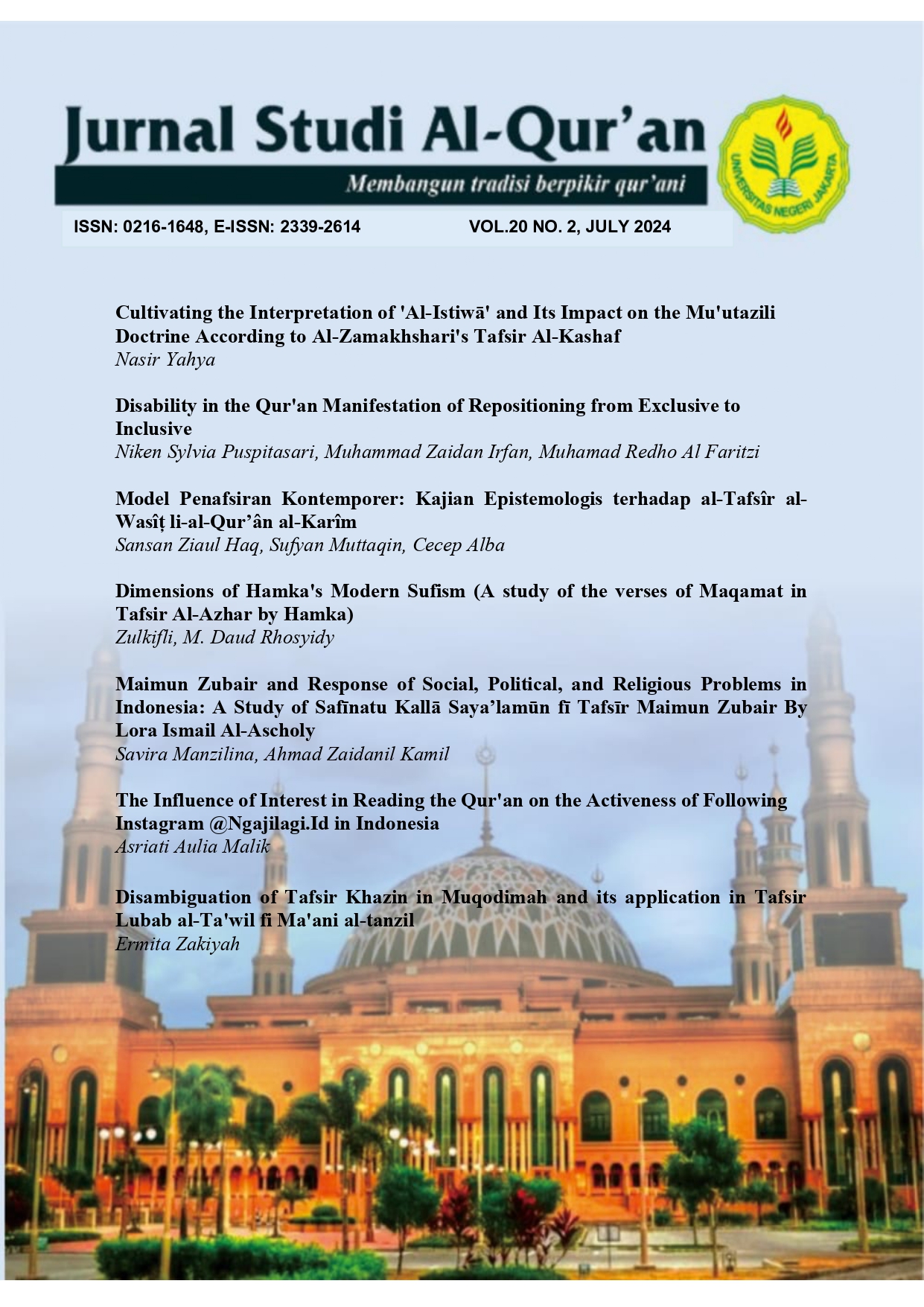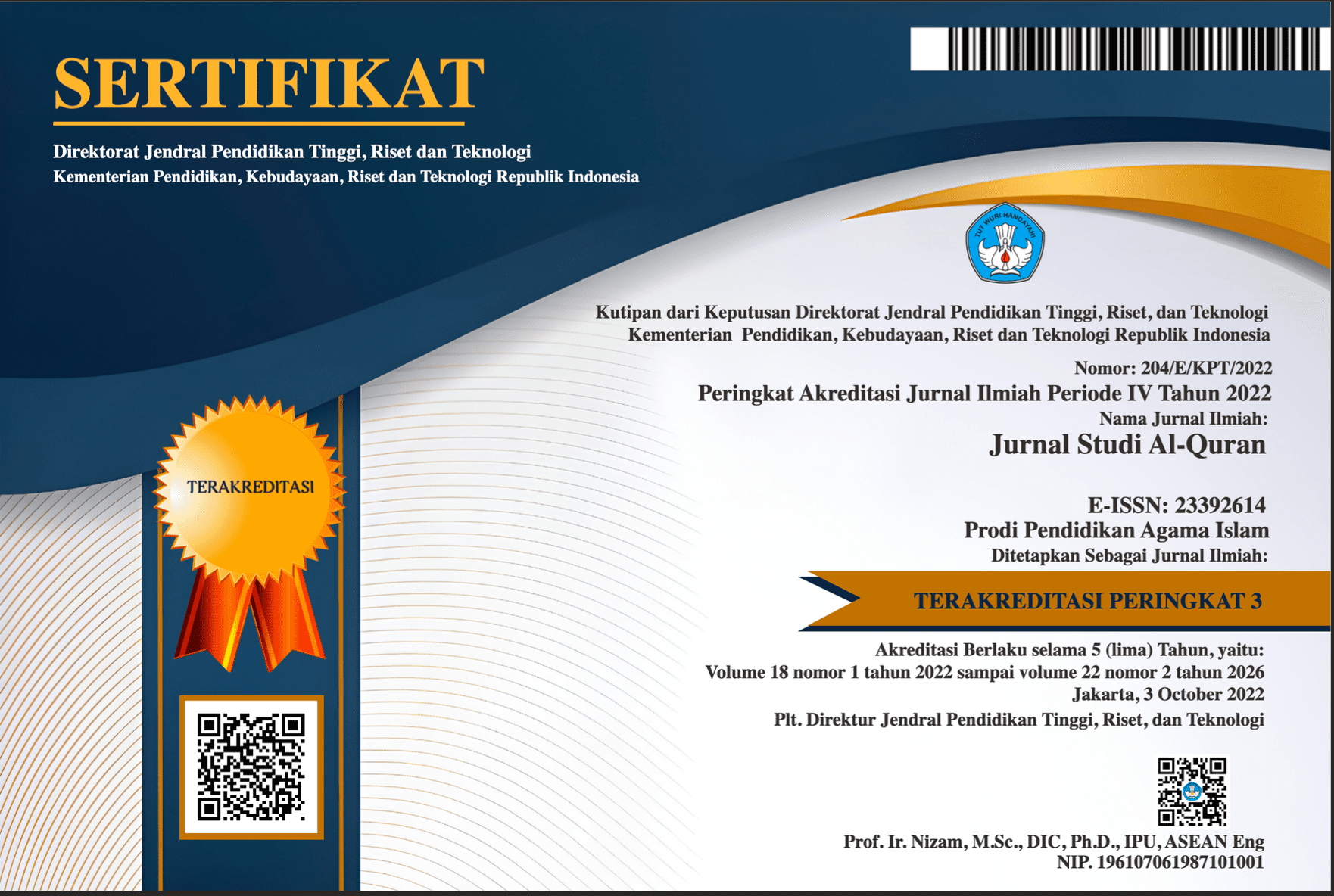Disability in the Qur'an Manifestation of Repositioning from Exclusive to Inclusive
DOI:
https://doi.org/10.21009/20.2.02Keywords:
Al-Qur'an, Disabilty, InclusiveAbstract
This research is motivated by the rise of ableism. This research aims to discover Disability in the Qur'an Manifestation of Repositioning from Exclusive to Inclusive. This research uses library research by making the library the primary source for obtaining data. This research uses a qualitative approach to examine the theme of disability in the Qur'an and how the sacred text can be understood in a modern context as an effort to reposition from exclusive to inclusive. The results show that the Qur'an has many words for disability, namely, a'ma/ umyun, akmah, bukmun, shummun, and a'raj. There are 38 verses spread across 26 surahs of the Quran. There are four verses in the entire Qur'an about a person that speaks directly about their attitude towards a disabled person or refers to a person with a physical disability. The Qur'an sees people with disabilities as having to be tolerant like ordinary people or behave equally towards others, especially those who are weak to discrimination, which is a manifestation of the repositioning of exclusive to inclusive.
References
Dahlan, Muhammad, and Syahriza Alkohir Anggoro. “Hak Atas Pekerjaan Bagi Penyandang Disabilitas Di Sektor Publik: Antara Model Disabilitas Sosial Dan Medis.” Undang: Jurnal Hukum 4, no. 1 (2021): 1–48.
Damayanto, Angga, Wening Prabawati, and Muhammad Nurrohman Jauhari. “Kasus Bullying Pada Anak Berkebutuhan Khusus Di Sekolah Inklusi.” Orthopedagogia 6, no. November (2020): 104–107.
Desiningrum, Dinie Ratri. Psikologi Anak Berkebutuahan Khusus. Yogyakarta: Psikosain, 2016.
Hikmawati, Eny, and Chatarina Rusmiyati. “Kebutuhan Pelayanan Sosial Penyandang Cacat.” Informasi 16, no. 1 (2011).
Ibnu Mazhur. Lisan Al-A’rab. Jilid 4. Beirut: Dar Shadir, 2010.
Idrayanti, Ariana. “NILAI MANUSIA DALAM PANDANGAN ALLAH (Kajian Ma’anil Hadis Dalam Kitab Musnad Ima>m Ah{mad No Indeks 10960).” Universitas Sunan Ampel, 2020.
Jamal, Khairunnas, Nasrul Fatah, and Wilaela Wilaela. “Eksistensi Kaum Difabel Dalam Perspektif Al-Qur’an.” Jurnal Ushuluddin 25, no. 2 (2017): 221.
Mestika Zed. Metode Penelitian Kepustakaan. Jakarta: Yayasan Pustaka Obor Indonesia, 2014.
Muhammad Reza Hamzah Fansury. “Penerimaan Sosial Masyarakat Pada Penyandang Disabilitas Sensorik.” Universitas Mercu Buana Yogyakarta, 2022.
Nindiya Sukmawati. “Peran Pemerintah Dalam Pemenuhan Hak Untuk Mendapatkan Pekerjaan Bagi Penyandang Disabilitas.” Media of Law and Sharia 2, no. 4 (2021): 367–382.
Nur, Muhammad Hafiz. “Disabilitas Menurut Al Quran (Kajian Studi Tafsir Tematik)” (2018): 1–71.
Pransiska, Toni. “Kejayaan Islam Dan Kontribusi Para Muslim Difabel: Sebuah Pendekatan Historis.” Turast: Jurnal Penelitian dan Pengabdian 5, no. 2 (2017). https://www.ejournal.uinib.ac.id/jurnal/index.php/turast/article/viewFile/366/243.
Rahakbauw, Nancy, and David Marthen Salakory. “Perlindungan Sosial Bagi Perempuan Disabilitas (Studi Di Himpunan Wanita Disabilitas Indonesia (HWDI) Maluku).” Aristo 6, no. 1 (2017): 145.
Shanty, Meita. Strategi Belajar Khusus Untuk Anak Berkebutuhan Khusus. Yogyakarta: Familia, 2015.
Siar, Lendy, and Rudy R. Watulingas. “HAK PENYANDANG DISABILITAS DI BIDANG POLITIK MENURUT UNDANG-UNDANG NOMOR 8 TAHUN 2016 TENTANG PENYANDANG DISABILITAS .” Lex Administratum 8, no. 3 (2020): 73–92.
Triyanto, Triyanto, and Desty Ratna Permatasari. “Pemenuhan Hak Anak Berkebutuhan Khusus Di Sekolah Inklusi.” Sekolah Dasar: Kajian Teori dan Praktik Pendidikan 25, no. 2 (2016): 176–186.
Yunus, Mahmud. Kamus Arab-Indonesia. Jakarta: Hidakarya Agung, 1989.
Downloads
Published
How to Cite
Issue
Section
License
Authors who publish with this Journal agree to the following terms:
- Author retain copyright and grant the journal right of first publication with the work simultaneously licensed under a creative commons attribution licensethat allow others to share the work within an acknowledgement of the work’s authorship and initial publication of this journal.
- Authors are able to enter into separate, additional contractual arrangementfor the non-exclusive distribution of the journal’s published version of the work (e.g. acknowledgement of its initial publication in this journal).
- Authors are permitted and encouraged to post their work online(e.g. in institutional repositories or on their websites) prior to and during the submission process, as it can lead to productive exchanges, as well as earlier and greater citation of published works.
Users/public use of this website will be licensed to CC BY










